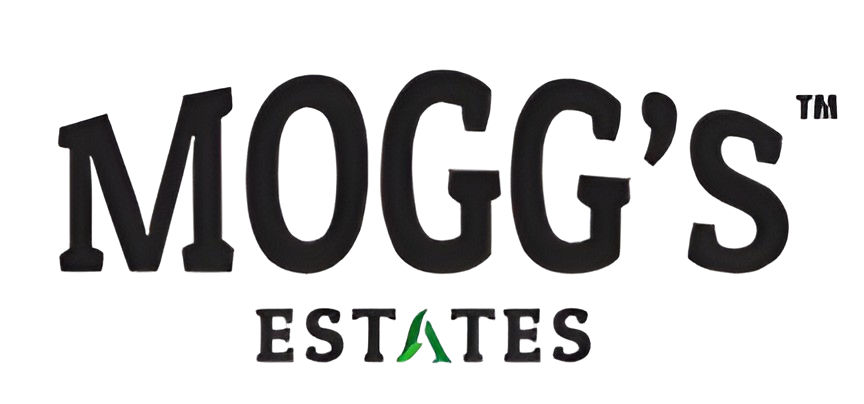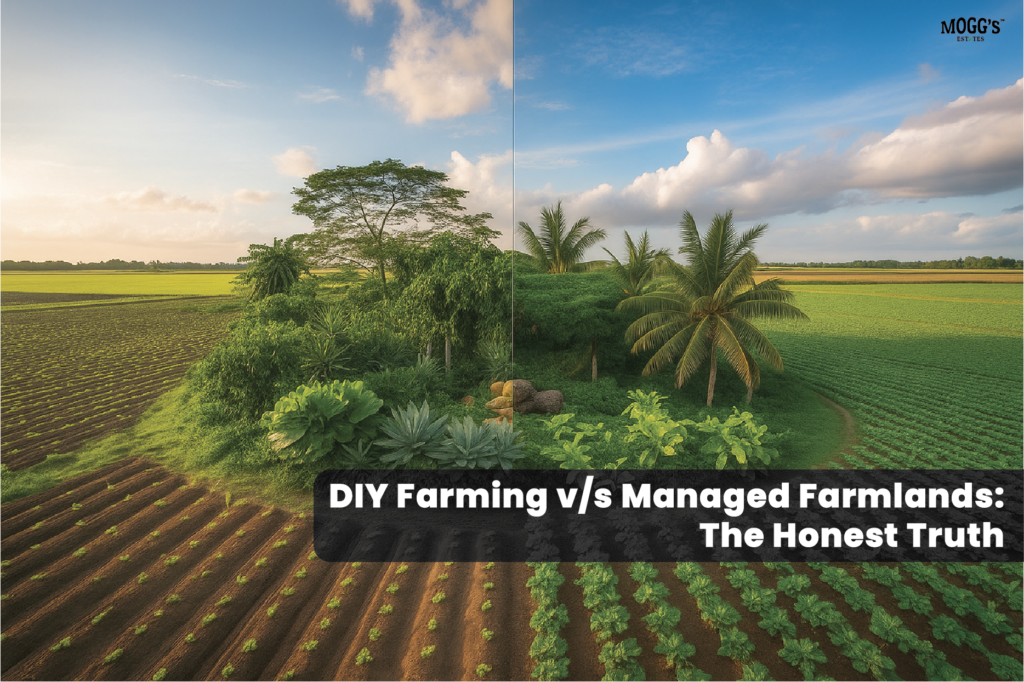The romanticized vision of owning farmland and cultivating it yourself has captivated many urban professionals in Bengaluru. The idea of weekends spent tilling soil, planting seeds, and harvesting your own organic vegetables sounds idyllic. But is DIY farming realistic for someone with a full-time career in the city? And how does it compare to the professionally managed farmland model? Let’s explore the honest truth about both approaches.
The DIY Farming Dream
There’s something deeply appealing about the prospect of becoming a hands-on farmer. Urban dwellers tired of their tech jobs and concrete surroundings often fantasize about escaping to their own plot of land, growing organic produce, and living a simpler life, at least on weekends.
The DIY approach typically involves purchasing agricultural land, learning farming techniques through books, YouTube videos, or agricultural workshops, and personally managing all aspects of cultivation. Some enthusiasts hire local laborers for heavy work but remain involved in decision-making and day-to-day operations.
The perceived advantages are compelling. You have complete control over what’s grown and how it’s cultivated. There’s immense satisfaction in eating vegetables you’ve personally nurtured from seed to harvest. The physical activity provides excellent exercise and stress relief. And for many, there’s a profound spiritual connection that comes from working directly with the earth.
However, the reality of DIY farming often proves far more challenging than the dream suggests. Let’s examine what aspiring farmer-investors actually face when they take this path.
The Reality Check: Challenges of DIY Farming
The first harsh reality is that farming requires constant attention. Crops don’t wait for convenient weekends. Irrigation needs to happen on schedule, regardless of your Monday morning meeting. Pests attack when they want, not when you’re available to deal with them. Unexpected weather events demand immediate response, whether you’re in the middle of a work presentation or not.
Knowledge gaps present another significant hurdle. Modern agriculture is surprisingly complex, involving soil science, pest management, crop rotation, water conservation, market dynamics, and seasonal planning. What seems simple in theory becomes overwhelming in practice. Should you plant during this moon phase or the next? Which natural pesticide works for which pest? When exactly is the right time to harvest? These aren’t questions with easy Google answers.
The physical demands are also substantial. Farming is backbreaking work, especially in Bengaluru’s climate. Weekend warriors often find themselves exhausted, sunburned, and nursing injuries by Sunday evening, with little energy left for the work week ahead. The romantic vision of leisurely tending to crops quickly gives way to the grueling reality of agricultural labor.
Financial unpredictability adds another layer of stress. Without professional expertise, crop failures are common. Your tomatoes might get blight, your lettuce might bolt in unexpected heat, or your entire harvest could be destroyed by a pest you didn’t know how to identify. Each failure represents not just lost produce, but wasted money on seeds, inputs, water, and labor.
Finding and managing reliable labor presents yet another challenge. Good agricultural workers are in high demand. When you’re only present occasionally, maintaining consistent communication and ensuring quality work becomes difficult. Workers may not follow your instructions precisely, or may not show up when needed most.
Then there’s the time commitment that many underestimate. What starts as a weekend hobby quickly expands to consume weekday evenings and mental bandwidth. You’ll find yourself researching pest solutions during lunch breaks, worrying about irrigation during meetings, and rushing to the farm after work when problems arise.
The infrastructure and tool investment is also substantial. You’ll need to purchase farming tools, install irrigation systems, build storage structures, arrange for electricity and water connections, and possibly construct shelter for yourself and workers. These costs add up quickly and require ongoing maintenance.
The Managed Farmland Model: A Different Approach
This is where the managed farmland model offers a compelling alternative. Companies like Mogg’s Estates have created a system that delivers the benefits of farmland ownership without the overwhelming challenges of DIY farming.
Managed farmlands provide professional agricultural expertise from day one. At Mogg’s Estates, experienced agronomists, soil scientists, and farming professionals handle every aspect of cultivation. They know exactly when to plant, what crops thrive in specific soil conditions, how to manage pests organically, and when to harvest for optimal yield and quality.
The professional management covers everything. Crop selection is based on scientific analysis of soil conditions, market demand, and seasonal factors. Irrigation systems are monitored and adjusted regularly using modern technology. Pest and disease management follows integrated organic practices that protect both crops and environment. Harvesting happens at the precise optimal time, and marketing connects your produce to the best available markets.
This approach eliminates the constant time commitment. You don’t need to be present for daily operations or make urgent trips to handle crises. The professionals at Mogg’s Estates manage everything while keeping you informed through regular updates, reports, and transparent communication. You can visit your farmland whenever you want to relax and enjoy the space, without the pressure of mandatory maintenance tasks.
Financial predictability improves dramatically with professional management. While no agricultural venture can guarantee returns, professional expertise significantly reduces the risk of complete crop failure. Mogg’s Estates experience in selecting appropriate crops, managing resources efficiently, and accessing proper markets leads to more consistent yields and better returns.
The infrastructure is professionally designed and maintained. Mogg’s Estates installs efficient drip irrigation systems, establishes proper drainage, creates necessary farm roads, and provides amenities like farmhouses and recreational spaces. All of this is maintained by professionals, so you don’t worry about repairs or upgrades.
Sustainability and eco-friendly practices are built into the system. Mogg’s Estates emphasizes organic farming, rainwater harvesting, solar power, and biodiversity conservation. These aren’t just buzzwords but implemented practices that enhance both environmental impact and long-term land value.
The Lifestyle Comparison
From a lifestyle perspective, the two approaches deliver very different experiences. DIY farming offers hands-on engagement but demands constant physical and mental energy. It can be deeply rewarding when things go well, but stressful and exhausting when they don’t. Your farmland becomes another job rather than a retreat.
Managed farmlands, on the other hand, offer the best aspects of rural land ownership without the burdens. You have a beautiful space to visit whenever you want, with walking trails, meditation areas, and recreational facilities created by Mogg’s Estates. You can bring family and friends for peaceful weekends without worrying about farming tasks. Children can learn about agriculture without the pressure of crop survival depending on their efforts.
You still have the satisfaction of owning productive agricultural land and contributing to sustainable farming. The difference is that professionals ensure success while you enjoy the benefits. You receive regular updates about your crops, can participate in harvests if you wish, and take pride in the organic produce grown on your land.
The Investment Perspective
From an investment standpoint, managed farmlands typically offer superior returns. Professional management by companies like Mogg’s Estates leads to better crop yields, lower losses, more efficient resource use, and better market access. These factors translate to higher returns on your agricultural investment.
Land appreciation is another crucial factor. Mogg’s Estates strategically selects locations in growth corridors around Bengaluru where infrastructure development and urbanization drive significant land value appreciation. Their projects in areas near Shivamoga, Kanakapura, Maddur, Kunigal, and Hoskotte have excellent growth potential.
DIY farming, conversely, often results in underutilized land. Without consistent professional attention, the land’s productive potential isn’t fully realized, which can impact both agricultural returns and long-term appreciation.
Making the Right Choice
The honest truth is that for most urban professionals with full-time careers, DIY farming is more challenging than rewarding. The time commitment, knowledge requirements, physical demands, and stress often outweigh the romantic appeal. Many who start with DIY enthusiasm eventually burn out or abandon their agricultural dreams altogether.
Managed farmlands offer a realistic, sustainable alternative that delivers the benefits of agricultural land ownership without the overwhelming challenges. Companies like Mogg’s Estates have refined this model to provide professional management, lifestyle amenities, sustainable practices, and attractive returns all in one package.
This doesn’t mean hands-on farming is wrong for everyone. If you’re genuinely passionate about agriculture, have time to dedicate to learning and practice, can handle physical labor, and accept the financial risks, DIY farming can be personally fulfilling. But be honest with yourself about your capabilities, time availability, and true motivations.
For most investors and lifestyle seekers in Bengaluru, the managed farmland model represents the sweet spot. You get the pride of owning productive agricultural land, the joy of a rural retreat, the satisfaction of supporting sustainable farming, and the financial benefits of professional management, all without the stress and demands of DIY farming.
Mogg’s Estates exemplifies this approach, offering complete farmland solutions where professionals handle the complexity while you enjoy the rewards. It’s not about taking shortcuts or avoiding work; it’s about smart delegation that lets you enjoy farmland ownership while professionals do what they do best.
The honest truth about DIY farming versus managed farmlands? For the vast majority of urban professionals, managed farmlands deliver better financial returns, lower stress, more enjoyment, and ultimately, a more sustainable relationship with agricultural land ownership.




